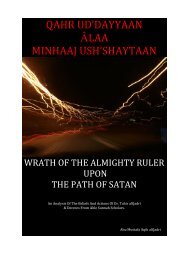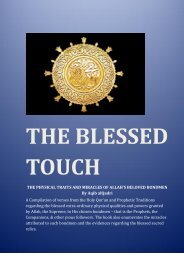The Book Of Prayer (Kitaab-ul-Salaat)
The Book Of Prayer (Kitaab-ul-Salaat)
The Book Of Prayer (Kitaab-ul-Salaat)
You also want an ePaper? Increase the reach of your titles
YUMPU automatically turns print PDFs into web optimized ePapers that Google loves.
Leaving the Sunnah habitually is close to forbidden (Haraam) and it is feared that (We seek<br />
Allah's refuge) such a person may remain deprived of the Holy Prophet's intercession. <strong>The</strong> Holy<br />
Prophet (peace and blessings be upon him) has proclaimed: "Whoever abandons the Sunnah will<br />
not obtain my intercession."<br />
THE CONDITIONS OF PRAYER (SHARAAET)<br />
<strong>The</strong> 6 conditions of <strong>Prayer</strong> are as follows:<br />
1. Purity - <strong>The</strong> body and the clothes of the one offering <strong>Prayer</strong> must be pure. Further, the<br />
place of worship must be clean. One must either have a bath (if the bath is comp<strong>ul</strong>sory)<br />
or else just the ablution (which is a must).<br />
2. Concealing the body - This is also called Satr-e-Aurat. That is to conceal / cover the<br />
necessary parts of the body. For men, this consists of the body between the navel up to<br />
and including the knees. For women this consists of the entire body, except the face,<br />
hands and soles of the feet. Women must hide their faces from strangers whilst not in<br />
<strong>Prayer</strong>s. Wearing clothes that are so thin that body colour is exposed will make the <strong>Prayer</strong><br />
void. Similar is the case of the head scarf if the shine of hair is revealed. In fact, wearing<br />
such clothes is prohibited even outside <strong>Prayer</strong>.<br />
3. Direction towards the “ Qiblah” (Kaaba) - this is called "Istiqbaal-e-Qiblah". <strong>The</strong> face<br />
and the chest must be directed towards the “ Qiblah” , whilst offering <strong>Prayer</strong>.<br />
4. <strong>The</strong> Time of <strong>Prayer</strong> - proper timing is the fourth condition of <strong>Prayer</strong>. <strong>The</strong> time for Dawn<br />
<strong>Prayer</strong> starts from actual dawn and ends at the beginning of sunrise. It sho<strong>ul</strong>d be offered<br />
within this period. <strong>The</strong> time for Afternoon <strong>Prayer</strong> starts from the time the sun crosses its<br />
zenith until the shadow of any object becomes double its actual length. (<strong>The</strong> actual length<br />
means the length of a shadow when the sun is at the meridian - i.e. half distance between<br />
sunrise and zenith).<br />
<strong>The</strong> time for Evening (Asr) <strong>Prayer</strong> starts from the time the Afternoon (Zohr) <strong>Prayer</strong> ends,<br />
and finishes at sunset. <strong>The</strong> period of 20 minutes before sunset is undesirable (Makrooh),<br />
therefore one sho<strong>ul</strong>d complete the Evening <strong>Prayer</strong> before this. If the <strong>Prayer</strong> co<strong>ul</strong>d not be<br />
offered before this due to some reason, then one sho<strong>ul</strong>d offer it during this period before<br />
sunset. <strong>The</strong> time for the Sunset (Maghrib) <strong>Prayer</strong> starts immediately after the setting of





